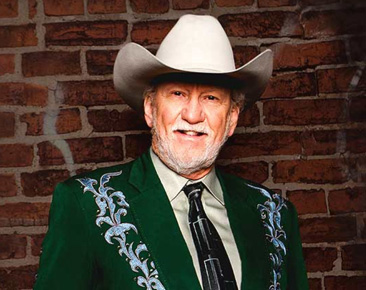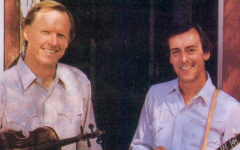
 Today marks Doyle Lawson’s 52nd year in bluegrass music. After serving stints with Jimmy Martin, J.D. Crowe, and the Country Gentlemen, Doyle has spent the past thirty-six years leading his own band, Doyle Lawson & Quicksilver. Quicksilver has been one of the consistent and influential bands in bluegrass for nearly four decades. Even after all of this time, Doyle is still just as hungry for making great new music.
Today marks Doyle Lawson’s 52nd year in bluegrass music. After serving stints with Jimmy Martin, J.D. Crowe, and the Country Gentlemen, Doyle has spent the past thirty-six years leading his own band, Doyle Lawson & Quicksilver. Quicksilver has been one of the consistent and influential bands in bluegrass for nearly four decades. Even after all of this time, Doyle is still just as hungry for making great new music.
His latest album, In Session was just released on Mountain Home Records, and his latest edition of Quicksilver has him very excited. I was blessed with the opportunity to chat with Doyle about his new album, the latest Quicksilver lineup, and some of the changes he has seen in bluegrass during his hall of fame career.
Daniel Mullins [DM]: Now, if my calculations are correct, you’ve released over forty Quicksilver albums. Is your new album forty-two or forty-three? If I’m not mistaken?
Doyle Lawson [DL]: Hahaha. I don’t know! I was thinking thirty-eight, but I don’t know. I’d have to go back and count them again to be honest with you. Somewhere between thirty-eight and forty-two— we’ll settle on that.
DM: Haha. Even though you’ve released close to forty Quicksilver albums over all of these years, you’re still able to keep the Quicksilver sound so relevant and so exciting. What’s your secret to keeping Quicksilver sounding so fresh after all of this time?
DL: Well, I love the music. If you run out of fire and you run out of desire for the music, and I’m saying music in general, then your creativity goes away, and the identity that one has been known for, for me thirty-six years, that goes away. As long as you can stay in love with the music and have that desire, always try to be creative and productive. I’ve been doing it a long time, and some people, I don’t know, maybe sometimes run out of that energy and desire, but I haven’t and the key is that my music has only changed as much as I want it to.
Plus the fact that you can’t change change — it happens. You can’t stop it. Over the years, your music kind of shades and kind of melds in with maybe some of the current times or whatever, but I’ve been very careful to keep myself immersed in our world of bluegrass. You can do that and still explore and be innovative and take a few wide steps, but I’ve always held on to the values and traditions of the music of the pioneers that I grew up with. People, the naysayers really, they need to realize that our pioneers were innovators. They had a new thing going. Anything that doesn’t grow, the only alternative to growth is death. We certainly don’t want our music to die and fade away.
DM: Without a doubt. You hit the nail right on the head about the originators of our kind of music being innovators. I think you exemplify that as well. You’re not afraid to get creative and stretch the envelope a little bit. Bend it but don’t break it, and you have done that for thirty-six years of Quicksilver, and I love you for it. Your music has always been some of my favorite, for that very reason.
DL: Aww, I thank you, Daniel. I appreciate that. I think that, as I said earlier, if a person doesn’t do that, you’re apt to burn out or flame out before you should. I can look at people that I admire, and I thought that they and a lot more to give, that they just kind of gave up and didn’t do it, for various reasons. Some people can’t get past the past, but you’ve got to move on. You can’t stay in the fact that it was like that then, and it’s not like that anymore, so I’m not gonna do anything else. That’s ridiculous! You keep going! You don’t give up just because it’s not like it was. It’ll never be like it was, because every day, life changes a little bit.
DM: Yeah. That is great.
In your thirty-six years of Quicksilver, what have you learned about bluegrass and the music business, and how is your perspective different now than it was in 1979?
DL: Well, my perspective is different because it’s a different world than it was in 1979. I say world, I mean the music world. You know, technology has made vast improvements, I think, in the quality of records (I still call them records) that we’re able to record and present to people. Whereas in the early days, a lot of those were you’d run into a radio station, and they’d cut a record or get some little makeshift studio or room and set up a mic and all that. It showed, because I thought that our music, as much as I love it, I thought even then that quality-wise, we suffered from the other music that was being recorded. I think that was one reason that the commercial country didn’t embrace us more in the early days because the recordings were really inferior quality-wise. Now, we had Lester & Earl, and Bill, Mac Wiseman, Jimmy Martin, the Osbornes, all them guys, they had major labels, but I’m talking about the guys at that time, say “the B-teams”: they didn’t have that luxury, and it takes more than a handful of artists. We had Reno & Smiley, the Stanleys, all the pioneers, but it takes more than that to make an industry. The B-Team guys, we didn’t have the luxury of being able to go down to the Quonset Hut or RCA Studios in those days. We had to take what we could get. Over time though, that all changed.
There’s been a total awareness to our music that we never had before. It’s not just in the United States. It’s not just the southeastern parts [of the country]. It’s in Europe, and I’ve spread it myself. I’ve carried it to the near East, the far East, North Africa, South America, and, of course, Canada. I’ve taken it over the years to forty-nine foreign countries as well as all fifty states, so that tells you how our music has grown and been accepted. There’s a huge love for the music in all parts of the world, so that part has changed.
The venues that we work. In the early days, I’ve got to tell you here, in the early days, if you didn’t have the luxury of touring on the road, which could sometimes be brutal, basically what we worked in was the bars. That was the venue three or four nights a week. Of course J.D. Crowe and I, when we worked together, we’d get five nights a week at the Holiday Inn Lounge, which was unheard of. When we were in there, nobody had ever played in a place that fancy, but it’s all changed. Some of it is change for the good, but you don’t ever lose sight of the fact that in some ways, we know that progress has a price. It doesn’t come free, so you give up some things to get some things, but overall, I think our music is in the plus column.
DM: I have to agree. It’s no longer a regional niche sort of music, as you mentioned. It’s truly international, and people are more aware of bluegrass now than ever before, and I know your success is a large part of that in the 21st century, on carrying our music forward.
DL: Well, I appreciate that. I still enjoy it. I enjoy the travel part of it. You know, obviously when you’ve done it as long as I have, you reach a point where (and it happens more frequent than it used to cause February 3rd will mark my 52nd year of being a professional musician) people come up to me and say “How long have you been doing this? I remember you way back with the Country Gentlemen,” or whoever, and they say “Well, when are you going to retire?” I say “Retire? And do what? Travel!? I’m already doing that!”
DM: Hahaha!
DL: Oh, but anyway, I’m still having a good time with it. And I hope that I have been a positive influence to the music and to the musicians along the way. I hope I have made a positive influence and impression on folks.
DM: Your new album is called In Session, which is obviously an allusion to your band’s nickname “The School of Bluegrass,” due to your ability to cultivate young bluegrass talent. What do you hope graduates of “The School of Bluegrass” learned from you during their time in Quicksilver?
DL: Well, they learned discipline. When people come, they’re young and so they’re not as experienced, but I teach them about phrasing, about the importance of everybody saying the word alike and phrasing together. I teach them to be conscious of pitch, not to get lackluster with it, and timing — it’s important.
I say, “Look— when we get to the stage, it ain’t my show, and it’s not your show. It’s ours, so you’ve got to be like a big machine, you know? You’ve got to play together.” I say, “If the fiddle player is taking a break, our job is to compliment him and make him sound better, and when the singer is singing, our job is to make him sound better while he’s doing the vocals.” Those are things that people, they don’t think about as a young person.
When they leave, I can tell the ones that really listened. When they leave, the ones that didn’t really pay much attention, it’s kind of the proof is in the outcome of what happens after that, you know? I’m very proud – there’s been a lot of people come through my band, and there’s been a lot of people that have gone on. It kind of reads like a “who’s who” in bluegrass for the young folks.
Somebody asked me one time, “Don’t you get tired of replacing musicians?” I said, “Well, no!” Here’s the deal. What if the music had stopped with Bill? What if he had been the only one? That nobody else was ever… I wouldn’t be here! But, it gives you a sense of pride.
I know people, so maybe they might tend to think that when somebody leaves that I’m bitter about it or I’m mad at them or they’re mad at me, and you know there’s a few unpleasantness sometimes, but overall, I’m not bitter about it, I’m not remorseful, because I don’t have time. When they leave, my job is to find somebody and keep working, so I don’t have time to miss anybody. I don’t mean that disrespectful, but you know, no more than I have time to be bitter about it. That’s all junk — I don’t have time for that. Wish them the best, because when they tell you they’re gonna leave, you’ve got all out of that musician that you’re gonna get, because he wants to move on, so don’t be bitter — wish them the best. Find somebody else, and keep the motor running.
DM: Yeah, the show must go on, as they say.
DL: Exactly.
DM: Now, all of the lineups of Quicksilver have seemed to have all had their own unique style and sound. What makes your current lineup of Quicksilver special and unique?
DL: The current lineup?
DM: Yes.
DL: Well, collectively, I have nothing bad to say about any makeup of the groups that have been here before, but once in a while, a body of musicians comes together and there’s just something a little special about it? I’m not being disrespectful, because I don’t have time for that either, but still, sometimes there’s a magic about things that doesn’t always happen in other situations, you know? These guys, I don’t know, there’s something about Eli and Dustin and mine’s trio, and then when we add Josh on the bass [vocals], there’s a big thickness to the vocals that is real robust. I like that.
I think the fact that most of my recordings we do in Josh’s studio, Josh Swift. It’s no secret that Josh is my right arm on the road, so we’re in his studio, not because I don’t like going to Crossroads, but they stay so booked up sometimes, my schedule won’t permit it. Josh has got the studio, so “Hey— we’ll do it there.”
Anyway, I think the guys, they get along good. Everybody’s got good personalities, and it’s a good thing, because not always do you have a group when everybody likes each other — they tolerate each other. But these guys, it’s a little different here.
DM: I have to agree. The vocals have really stood out to me with this group, and like you said, nothing bad about any of the other lineups, but there’s a spark with these guys. You’ve really got something special going on.
DL: I think so, and again, I speak of any past member out of respect. No ill feelings or ill intentions at all, but you asked me a question, and I’m trying to answer you honestly.
DM: I totally understand. Why don’t you tell me about your new album, In Session, and what makes it unique in the Quicksilver catalog?
DL: Well, I try to make each recording a little different from the others and still keep the sound, but I want it to be different. Roads Well Traveled was my bluegrass release before. It had some great songs, but they could really get you sad, How Do You Say Goodbye to Sixty Years and things. I wanted this to be a little more cheerful, and you can hear it. I wanted it to be happier. [There’s] just a little bit more on the real traditional stuff: Reasons Why, Evening Prayer Blues, Weep and Cry. I tried to get it across the board. Give something for everybody’s ear, I hope.
DM: Oh, you succeeded. The variety on this album. Everything from old Moe Bandy’s Americana to Evening Prayer Blues, which is as old as the hills, plus great new songs such as Captain and Roll Big River from your own band, it really runs the gamut on this record. I love it.
DL: Well, I’m very proud of it.
DM: Thank you so much for your time, Doyle. I really appreciate it, and I hope to talk to you again soon.
DL: Take care. Thanks for talking to me.







